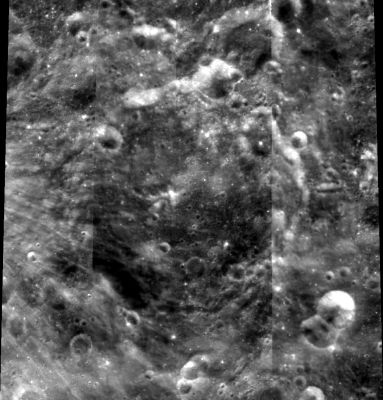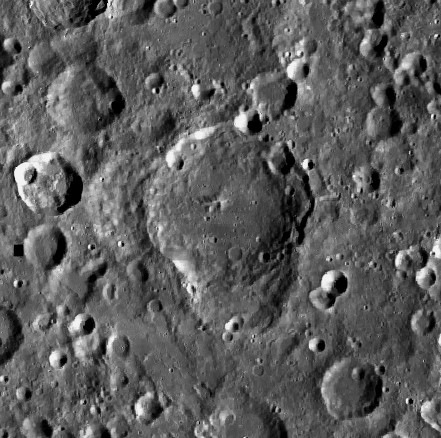Difference between revisions of "Joule"
(Created page with "<div id="content_view" class="wiki" style="display: block"> =Joule= {| class="wiki_table" | Lat: 27.3°N, Long: 144.2°W, Diam: 96 km, Depth: km, Rükl: ''(farside)''<br />...") |
|||
| Line 19: | Line 19: | ||
==Nomenclature== | ==Nomenclature== | ||
* [http://en.wikipedia.org/wiki/James_Prescott_Joule James Prescott Joule], FRS (December 24, 1818 – October 11, 1889) was an English physicist. Joule studied the nature of heat, and discovered its relationship to mechanical work. This led to the theory of conservation of energy, which led to the development of the first law of thermodynamics. The SI derived unit of energy, the joule, is named after him. He worked with Lord [/Promontorium%20Kelvin Kelvin] to develop the absolute scale of temperature, made observations on magnetostriction, and found the relationship between the flow of current through a resistance and the heat dissipated, now called Joule's law. | * [http://en.wikipedia.org/wiki/James_Prescott_Joule James Prescott Joule], FRS (December 24, 1818 – October 11, 1889) was an English physicist. Joule studied the nature of heat, and discovered its relationship to mechanical work. This led to the theory of conservation of energy, which led to the development of the first law of thermodynamics. The SI derived unit of energy, the joule, is named after him. He worked with Lord [/Promontorium%20Kelvin Kelvin] to develop the absolute scale of temperature, made observations on magnetostriction, and found the relationship between the flow of current through a resistance and the heat dissipated, now called Joule's law. | ||
| − | * The small bowl-shaped high albedo crater on the western part of the rim of raycrater '''Joule T''' (west of '''Joule''' itself) received the official name [http://the-moon. | + | * The small bowl-shaped high albedo crater on the western part of the rim of raycrater '''Joule T''' (west of '''Joule''' itself) received the official name [http://the-moon.us/wiki/Wargo Wargo] in July 2017. |
<br /> | <br /> | ||
==LPOD Articles== | ==LPOD Articles== | ||
Revision as of 19:17, 11 April 2018
Contents
Joule
| Lat: 27.3°N, Long: 144.2°W, Diam: 96 km, Depth: km, Rükl: (farside) |
Table of Contents
[#Joule Joule]
[#Joule-Images Images]
[#Joule-Maps Maps]
[#Joule-Description Description]
[#Joule-Description: Wikipedia Description: Wikipedia]
[#Joule-Additional Information Additional Information]
[#Joule-Nomenclature Nomenclature]
[#Joule-LPOD Articles LPOD Articles]
[#Joule-Bibliography Bibliography]


Upper frame: Clementine.
Lower frame: LROC; which also shows bright ray crater Joule T near the frame's left margin, with bright crater Wargo on the western part of its rim.
Images
LPOD Photo Gallery Lunar Orbiter Images Apollo Images
Maps
([/LAC%20zone LAC zone] 52A3) USGS Digital Atlas PDF
Description
Description: Wikipedia
Additional Information
Crater Joule is easy to recognize because of its "hanging bag" Joule L south of it.
Nomenclature
- James Prescott Joule, FRS (December 24, 1818 – October 11, 1889) was an English physicist. Joule studied the nature of heat, and discovered its relationship to mechanical work. This led to the theory of conservation of energy, which led to the development of the first law of thermodynamics. The SI derived unit of energy, the joule, is named after him. He worked with Lord [/Promontorium%20Kelvin Kelvin] to develop the absolute scale of temperature, made observations on magnetostriction, and found the relationship between the flow of current through a resistance and the heat dissipated, now called Joule's law.
- The small bowl-shaped high albedo crater on the western part of the rim of raycrater Joule T (west of Joule itself) received the official name Wargo in July 2017.
LPOD Articles
Bibliography
This page has been edited 1 times. The last modification was made by - tychocrater tychocrater on Jun 13, 2009 3:24 pm - afx3u2